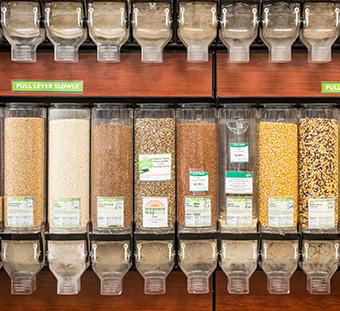
To Be a Bulk Hero, Contain Your Enthusiasm
My family and I shop at Weavers Way about 80 percent of the time, and we have refined our shopping habits to favor a Zero Waste shopping model. We have a beautiful woven basket and inside I keep several reusable cloth bags and a few plastic containers for tofu and pickles and other things that obviously wouldn’t do well in cloth. I keep this stuff in the trunk of my car. After we unload our groceries, we just walk right back out to the car and put the basket back in the trunk. This way, I know it’s always ready to go and I don’t run the risk of leaving it at home accidentally.
The other 20 percent of the time, we go to the regular grocery store. I didn’t always loathe it. However, as I got deeper and deeper into my research, every time I stepped into a conventional market all I could see were shelves of waste. I know we are lucky in our society to have access to such a bounty and of food and variety of products, but once we use up the stuff, we are left with the package — and quite often the package will have a negative impact on our planet.
There is no way to avoid it — is there? Yes, in fact, bulk shopping is an awesome way to avoid the package.
Most consumers don’t think about the fact that the cost of the package is wrapped up in the product — according some estimates, an average of 10 percent of your bill.
Beyond the household costs, the environmental benefit is huge. Between bulk shopping and composting, my family of three generates less than a 10-gallon container of waste a week. Still, sometimes we need something that we can’t buy in bulk or my kids bring home a giant plastic thing. It happens.
Here are some things I hear when I suggest bagging the packaging:
“It’s inconvenient”
Let’s think about the idea of convenience and how it’s been marketed to us. We do some really silly stuff in the name of convenience and don’t even think about the bigger impact.
I get this argument a ton about bottled water. Do I sound obnoxious when I say that sometimes we act like we have to get lowered down a well to access drinking water? Those convenient bottles are made of petroleum and a bunch of metal oxides. A study by the Pacific Institute showed you could fill a plastic water bottle 2/3 of the way with petroleum with the amount of fuel it takes to fill, transport and recycle the bottle itself. So while something seems convenient, we aren’t taking into account the true costs — not to mention the inconvenient impact on communities in east Asia that are melting the plastic in factories that have poor ventilation.
“It’s healthier”
Our grocery system favors a mass-production, mass-distribution model. That’s why so many foods have additives to keep them fresh on the shelf. But there’s nothing “unhealthy” about bulk foods — especially in a well-managed, high turnover operation like Weavers Way’s. And you aren’t getting all those fillers and preservatives that enable mass packaging in the first place.
“It’s cheaper”
Many mass-produced products ARE cheap. But with pre-packaging, you don’t get to decide how much to buy — and again, you’re paying for the packaging.
“I don’t know where to start”
Now this is an easy one. Weavers Way has a bulk section in each store — a small one in Chestnut Hill and miles of aisles in Ambler and Mt. Airy.
One thing that trips people up is “The Tare” — the process of getting the weight of your empty container so you’re not charged for it.
R-E-L-A-X. First, the plastic produce and bread bags, cellophane bags and paper bags stocked in Bulk have NO tare weight. Second, cashiers are used to helping customers who neglected to tare and can make an estimate.
With that in mind:
- If you bring glass jars or plastic containers, you will need to weigh them empty at one of the scales in the bulk section. Mark the tare weight on the container. Use a sticker if you like. The cashier will subtract the tare weight at the register. (Weavers Way also sells containers and bottles — just make sure you get in the habit of actually cleaning and using them again!)
- If you bring canvas or cloth bags for bulk purchases, you should tare them as well. Some can be surprisingly heavy.
- Find the PLU number of the product — “Price Look-Up,” grocery-speak for how the item will be entered in the cash register — on the bin or dispenser, and write it on a sticker, the container or a twist tie.
- Fill your container from the bulk bin.
That’s it! (And feel free to let someone in the Bulk Department know if there’s something you’d like to see that isn’t there.)
Shopping in bulk empowers us as consumers and liberates us from the consumer packaging trap. It’s not really all that inconvenient — and you get to feel like an environmental superhero when you realize how much less trash and recycling your household is generating!

